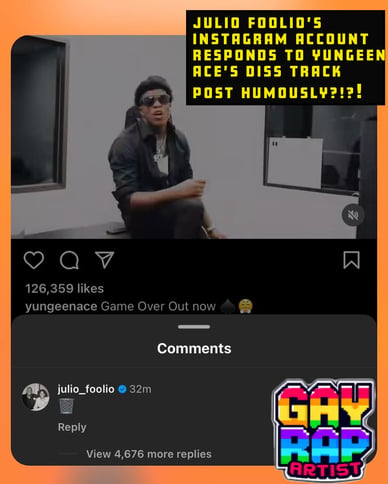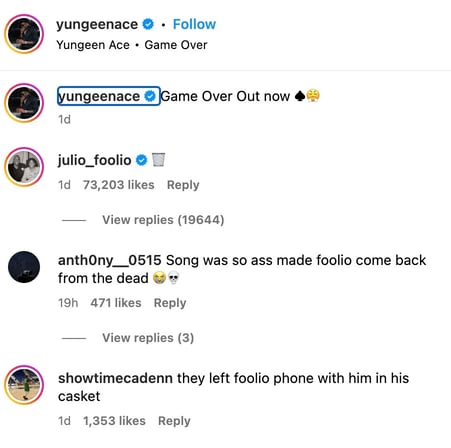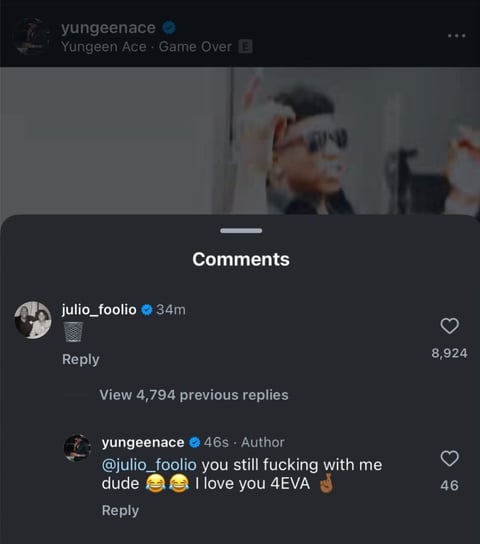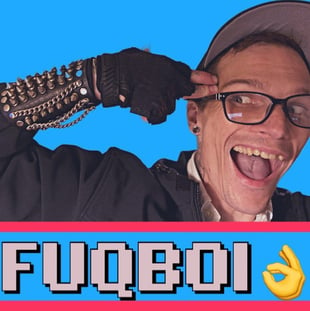
Julio Foolio's Instagram Reacts to Yungeen Ace's Diss Video
Fans are left wondering if Julio Foolio's Instagram account was hacked, scheduled, or if something more mysterious is at play after his death. Find out who is posting on his account.
NEWSHIP HOPBEEFDISS TRACKS


The Strange Case of Julio Foolio's Posthumous Instagram Activity
The rap community was recently rocked by the tragic news of Florida rapper Julio Foolio being shot and killed. Known for his provocative and controversial lyrics, Foolio often bragged about having a "list of dead opps" in his songs, even going as far as filming a music video dancing on the grave of one of his rivals. His untimely death left fans and fellow artists in shock, and the ensuing events have only added to the bewilderment.
Adding fuel to the fire, not long after Foolio's death, fellow rapper Yungeen Ace dropped a controversial music video titled "Do It." The song, brazen and unapologetic, seemed to take credit for the attack on Foolio. This bold move ignited a frenzy of reactions from fans, critics, and the hip-hop community at large. Yungeen Ace then doubled down with another track, "Game Over," further fueling the controversy.
But the most bizarre twist in this unfolding drama came shortly after the release of "Game Over." Foolio's official Instagram account responded to the video with a single, cryptic emoji: a trashcan. This unexpected reply sent shockwaves through social media, raising an eerie question – how can Julio Foolio's Instagram account be active if he is deceased?
Speculation ran wild. Was Foolio's account hacked? Was this the work of someone close to him, continuing his social media presence? Or is there some other explanation that hasn't yet come to light? The internet was abuzz with theories and conspiracies, each more outlandish than the last.
Some fans suggested that Foolio might have scheduled posts before his death, but a specific response to a video that came out after his death seemed highly unlikely. Others wondered if someone with access to his account decided to stir the pot, using Foolio's death as a way to send a posthumous message.
The timing and nature of the post raise serious questions about digital legacy and the control of social media accounts after someone passes away. While it’s not uncommon for family members or close friends to manage the accounts of deceased loved ones, the trashcan emoji response seemed to carry a personal touch, almost as if Foolio himself was calling out Yungeen Ace from beyond the grave.
Foolio, whose real name was Charles Jones, had made a name for himself in the Jacksonville rap scene with his raw, unfiltered style. He was no stranger to controversy, often embroiled in feuds with rival rappers. His lyrics frequently referenced real-life violence and loss, with Foolio proudly boasting about the number of his enemies who had met untimely ends. One of his most infamous videos featured him dancing on the grave of a rival, a move that many saw as crossing the line from art into real-life disrespect.
Yungeen Ace, on the other hand, has also been a prominent figure in the Jacksonville rap scene. Known for his own violent lyrics and his ongoing feud with Foolio, Ace's decision to release videos seemingly celebrating Foolio's death was seen by many as an attempt to further escalate their feud, even beyond the grave.
The Instagram post in question appeared shortly after "Game Over" went live. The trashcan emoji, simple yet loaded with meaning, suggested that Foolio—or someone using his account—viewed the video as garbage. The post quickly went viral, with fans and media outlets picking up the story and amplifying the mystery. How could Foolio's account be active? Who was behind the post? And what did it mean for the already tense situation between the two camps?
Social media has become an integral part of modern life, and for many, it remains active even after death. Celebrities, in particular, often have teams managing their accounts, ensuring that their digital presence continues to engage fans. However, the idea that someone would use Foolio's account to comment on a video released after his death adds a chilling layer to this practice.
Fans speculated about the possible explanations. Could it have been a hacker, someone looking to stir up trouble or gain notoriety by using Foolio's account? Hacking is not uncommon in the digital age, and high-profile accounts are often targeted. But hacking typically aims for financial gain or chaos, not a cryptic emoji on a rival's video.
Others thought it might be a close friend or family member, someone with access to Foolio's phone or social media credentials. This theory seemed plausible, especially given the personal nature of the post. Yet, it raised ethical questions about the management of social media accounts after someone's death. Should loved ones use the deceased's account to settle scores or send messages? And what if they did so without the deceased's prior consent?
Then there was the possibility of scheduled posts. Many social media platforms allow users to schedule posts in advance. Perhaps Foolio had anticipated his death or simply wanted to leave behind a series of messages. But the specificity and timing of the trashcan emoji response seemed too precise to be a pre-scheduled post.
Yungeen Ace did not remain silent. In response to the posthumous comment from Foolio's account, Ace remarked, "You still f*cking with me dude," accompanied by two laughing emojis. He then added, "I love you 4eva." This response further muddied the waters, leaving fans wondering whether Ace knew more about the situation or if he was simply capitalizing on the drama to further his own narrative.
In the broader context, this incident sheds light on the evolving nature of digital legacies. In an era where our online personas often outlive our physical ones, the management of these digital identities becomes increasingly complex. Social media platforms have yet to develop comprehensive policies for posthumous account management, leaving much to the discretion of the deceased's loved ones.
Julio Foolio's case is a stark reminder of the lasting impact of our digital footprints. Even in death, our online actions—or those taken on our behalf—can provoke, unsettle, and fascinate. The trashcan emoji, a seemingly simple gesture, has become a symbol of the blurred lines between life and death in the digital age.
As the story continues to unfold, one thing remains clear: Julio Foolio's legacy, both musical and digital, will continue to resonate. His untimely death and the subsequent events have sparked important conversations about digital identity, privacy, and the ethics of posthumous social media management. While the truth behind the Instagram post remains elusive, the impact of Foolio's life and death is undeniable.
In the end, whether the post was the work of a hacker, a loved one, or some other force, it serves as a poignant reminder of the power and permanence of our digital lives. Julio Foolio may be gone, but his presence—both online and in the memories of his fans—continues to loom large, a testament to the enduring influence of his controversial and provocative career.








